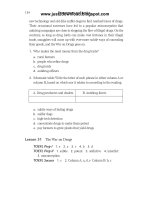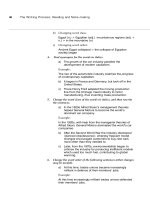Tài liệu Academic Writing A Handbook for International Students part 6 docx
Bạn đang xem bản rút gọn của tài liệu. Xem và tải ngay bản đầy đủ của tài liệu tại đây (205.23 KB, 10 trang )
40
The Writing Process: Writing Stages
iii)
iv)
c) Conclusion:
4.
Decide which of the three structures in (2) would be most
suitable for the following titles.
a) Prisons make criminals worse, and should be
abolished – discuss.
b) In the UK, radio is gaining audience while TV is losing
viewers. Consider possible reasons.
c) Trace the development of mass production and
evaluate its main benefits.
d) ‘Examinations can never be fair.’ To what extent is this
true?
e) The internet will make books redundant in twenty
years – discuss.
5.
Study the title below and the ideas collected for the essay. Add
to the list if possible. Then choose a suitable framework and
complete the plan below.
Compare the effects of advertising on TV with advertising
in newspapers. What are the main differences? Are there
any similarities?
TV adverts more lively, dynamic
newspaper adverts can be targeted at a special
market, e.g. local
TV advertising very expensive (to make and show)
many people video TV and fast forward adverts
newspaper adverts can be prepared more quickly
TV adverts can reach a wider audience
a) Introduction: role of newspapers and TV in society today
b) Main body:
i)
ii)
cross-reference
2.4 Comparison
1.11 Planning Essays
41
iii)
iv)
c) Conclusion:
6.
Choose one of the titles below and note at least six ideas that
might be used in the essay. Then select a suitable framework and
write a plan.
a) In 20 years’ time most learning will be on-line: the internet
will replace the classroom – discuss.
b) Describe the education system in your country and
suggest how it could be improved.
Ideas
Plan
7. In the case of longer essays, written as coursework,
planning should be more detailed. It will normally be a
two-stage process:
a) before reading: using the title to develop an outline
structure
b) after reading: modifying the outline and adding detail
Study the notes below. Use them to write a plan for the title.
Title: Student numbers in higher education are rising
in most countries. Is it desirable to keep increasing the
numbers of young people who take a degree?
a) In 1985 12% of young people went to university in the
UK. Now the figure is over 30%. Similar growth has
been experienced in many countries, developed and
developing.
42
The Writing Process: Writing Stages
b) Recent research (Jackson et al.) shows that
employers are looking for personal skills rather than
educational qualifications.
c) The average student in Britain now leaves university
with debts of £15,000.
d) University education may help students from poorer
families to move into a higher social position.
e) Modern economies are based on knowledge.
Therefore, every country needs to educate its
workforce as highly as possible to compete with other
economies.
f) Because increasing numbers of young people are
gaining a first degree, their degrees are worth less.
It is now necessary to have a second degree to
compete in the labour market.
g) As student numbers rise, standards fall. Classrooms
become more crowded, and overworked teachers are
less able to give students personal attention.
1.12 Organising Paragraphs
Paragraphs are the basic building blocks of texts. Well-organised
paragraphs not only help readers understand the argument, they also
help writers to structure their ideas effectively.
1. Read the following paragraph.
The way we use banks is currently changing. This is partly
because of the introduction of new technology in the last
ten years. The personal computer and the internet, for
instance, allow customers to view their accounts at home
and perform operations such as moving money between
accounts. At the same time banks are being reorganised
in ways that affect both customers and staff. In the
past five years over 3,000 bank branches have closed
in Britain. The banks have discovered that staffing call
centres is cheaper than running a branch network.
The structure of the paragraph is:
1. topic sentence
The way we use banks . . .
2. reason
This is partly because . . .
3. example
The personal computer . . .
4. information
At the same time banks . . .
5. information
In the past five years . . .
6. reason
The banks have discovered . . .
2. a) A paragraph is a collection of sentences which deal with
one subject.
b) All paragraphs contain a topic sentence, which is often,
but not always, the first.
c) Other components vary according to the nature of the
topic. Introductory paragraphs often contain definitions,
while descriptive paragraphs include a lot of information.
Other sentences give examples and offer reasons and
restatements.
3.
Read and analyse the following paragraph.
In recent years all British universities have adopted the
semester system. A semester is a period of time which
lasts for half the academic year. Semester 1, for example,
starts in September and finishes in January. Previously
the academic year had been divided into three terms:
autumn, winter and spring. Most courses consist of
modules which last for one semester, and exams are
held at the end of each. Britain began using semesters to
make it easier for international students to move from one
country to another.
cross-reference
2.5 Definitions
2.7 Examples
2.12 Restatement and
Repetition
44
The Writing Process: Writing Stages
1.
2.
3.
4.
5.
6.
4. The sentences below form a paragraph, but have been
mixed up.
Use the table to rewrite the sentences in the correct order.
a) The Romans were the first people to build a bridge
near the position of today’s Tower Bridge.
b) London has been the English capital for over 1,000
years.
c) Over 500 years ago the area below the bridge had
become a major river port for ships trading with
Europe.
d) Its dominance is due to its strategic site near the
lowest crossing point of the River Thames.
e) For many centuries it has been the centre of the
country’s economic, cultural and social life.









